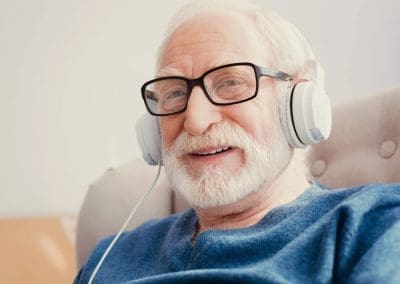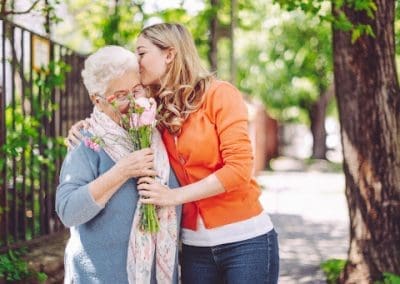As we grow older, our social lives change, and many traditional activities are less accessible than before. Meeting friends for coffee, going to the gym, or attending events like theaters, weddings, and worship services have become challenging. Isolation can be difficult for anyone, but especially for those prone to depression and anxiety.The stress and anxiety that loneliness causes reduces your ability to fight infection and inflammation.
What’s more, loneliness can shorten your lifespan. According to former U.S. Surgeon General Dr. Vivek Murthy, it’s equivalent to smoking 15 cigarettes a day and exceeds the risks associated with obesity, excessive alcohol consumption, and lack of exercise.
So if you’re feeling isolated and wondering what you can do to help yourself while staying at home, try these indoor activities for seniors. Even in colder months, there are plenty of fun winter activities for seniors to enjoy indoors. They’ll help you stay engaged and active, and you may find them rewarding enough to continue long after the season has passed.
Stay Connected with Friends and Family
- Write a letter. A handwritten letter feels more personal and thoughtful than a text or email. Put your thoughts on paper and send them to someone you care about. Or reconnect with an old friend. They’re going through the same thing you are and would love to hear from you. Your local library may also have a pen pal program you could join. It’s a great way to make new friends, young and old.
- Pick up the phone. Whether you’re talking to your grandchild or catching up with a friend, reaching out to someone every day can help you feel better about your situation. FaceTime and free online services like Skype or Zoom allow you to hold video chats so you can see another face besides the one in the mirror.
- Read books to grandkids. Connect online and read a bedtime story. Your grandchild will appreciate it and so will Mom and Dad, who may be struggling to balance work, meals, homeschooling and the demands of a young family. You could also volunteer to read books to others through your library or community center.
- Make a family scrapbook. Dig out that dusty old box of family photos and sort them into groups. Focus on a special trip your family took or another meaningful event you wish to document. Put the photos in a scrapbook and personalize it to make it your own. Scrapbooks make wonderful gifts and will be treasured for years to come.
- Research your family history. Ask relatives what they know about your family’s history. You might be surprised by the stories you hear. In any case, you’ll build a richer picture of who you are and where you came from. If you’re wondering who shares your DNA, you could look into Ancestry.com or 23andMe. But beware, there are privacy concerns with genetic testing.
Make Exercise a Part of Your Day
- Do strength training. You don’t need fancy weight machines to build muscle. Use your bodyweight to get stronger. If you don’t have dumbbells, substitute cans of food or water jugs. You can also order resistance bands online. Try to do strength training two or more days a week. You can find indoor exercises for seniors on YouTube, or download this strength training program from the Centers for Disease Control and Prevention.
- Try chair exercises. If mobility is an issue, you can still get in a good workout from a seated position. Try these chair exercises at home. They’ll give your whole body a workout and help reduce your risk of falling. You can also do chair yoga to reduce stress, increase flexibility and build strength.
- Do aerobic exercises. The American Heart Association recommends older adults get 2½ hours of moderate-intensity aerobic activity a week. Simple exercises like marching in place or jumping jacks are easy ways to get your heart pumping. You can also walk around the house or go up and down stairs. Check out these workout videos designed for older adults.
- Play virtual sports. Video games like Wii Golf and Wii Bowling are the next best thing to swinging a golf club or throwing a strike. If you haven’t tried them, they’re as easy to use as swinging your arm, and loads of fun.
Play Games for the Fun of it
- Solve a crossword puzzle. Crosswords are a great way to relax and give your gray matter a workout. Studies show that doing crossword puzzles may even reduce your risk of dementia. If crossword puzzles aren’t your cup of tea, you can find all kinds of brain games for seniors online, including Mahjong, Sudoku, chess and solitaire.
- Get out your board games. Dust off your Monopoly or Scrabble board and introduce a family member to an old school favorite. Or find a deck of cards and deal them out. Failing that, work on your card tricks.
- Do a jigsaw puzzle. You can do it on your own or make it a family activity. Many people find jigsaw puzzles calming. They may be the same people who’ve never lost a puzzle piece or found it after Fido chewed it over. Nevertheless, creating order out of chaos can give you a feeling of control and accomplishment. It may even improve your spatial skills and reduce the risk of developing dementia.
Engage Your Brain
- Take an online class. Now is a great time to expand your mind. There are over 900 free courses to explore at OpenLearn, the website for The Open University. The Osher Lifelong Learning Institute also offers online courses. In addition, the Massive Open Online Courses (MOOCs) offer thousands of classes on topics from digital photography to paleontology. They’re free to anyone with a love of learning.
- Write a memoir. You’ve got a lifetime of stories to draw from. Write down those you want to share with your children and grandchildren. Writing a memoir can help you understand the past and give you a renewed appreciation for a life well-lived.
- Visit a museum or theater online. The British Museum recently put 1.9 million works of art online. Closer to home, you can visit Chicago’s many museums, zoos, parks, theaters and iconic architecture from the comfort of home.
Indoor Activities for Seniors at Sedgebrook
At Sedgebrook, we know how important it is to keep mind, body and spirit actively engaged. Social distancing hasn’t changed our priorities; it’s simply changed our approach.
Residents are staying connected and engaged with a full calendar of online activities, including fitness classes and virtual social events. To learn more about how we’re living fully and safely during this time of social distancing, feel free to reach out to our team.



